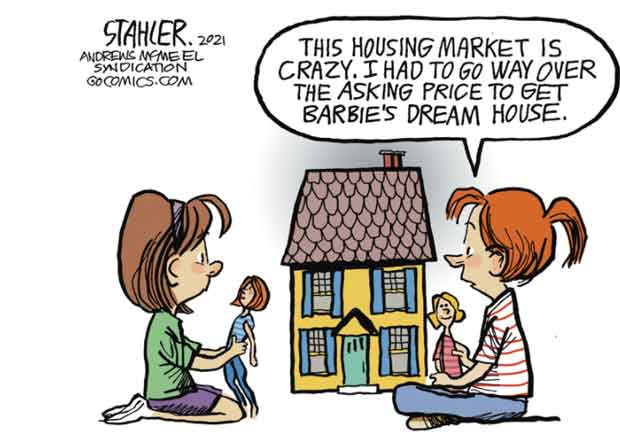
With mortgage rates having breached 6%, the housing market is slowing. And while this might be an acceptable short-term price to pay in the fight against inflation, it's going to create future supply-chain problems once inflation is under control and we're ready for activity to pick up again.
The refinancing market is providing a glimpse of what's to come. When mortgage rates are low, as they were from 2020 through the beginning of 2022, refinancings surge as homeowners take advantage of lower rates to secure a smaller monthly payment and take cash out of their homes.
That process generates economic activity and jobs for people who assist in the transaction - loan officers, appraisers and closing attorneys - even software companies like DocuSign, as anyone who refinanced over the past couple years can attest.
But with mortgage rates north of 6%, refinancings have screeched to a halt, down more than 80% from the pandemic peak and now at their lowest level in over two decades.
This is leading to layoffs at companies operating in the mortgage sector, such as loanDepot, because there is simply not enough work to do.
Unfortunately, layoffs are spreading deeper through the housing industry. Real estate brokerage Compass said on Tuesday it was laying off 10% of its staff, followed by Redfin Corp., another brokerage, announcing job cuts as well.
There are a lot of layers to this new market. Mortgage rates below 3% didn't make sense for the inflation and growth environment that we've had over the past year, and it's possible we won't see rates that low again. So to the extent housing and refinancing activity required sub-3% rates to be viable, it's OK that those jobs are disappearing.
Additionally, it's true that inflation is too high and demands a policy response, and the housing market was unsustainably hot, with home prices and mortgage rates combining to create extreme affordability challenges. So it makes sense to raise mortgage rates to help cool off both inflation and the housing market. The concern comes when we realize there is a wave of tens of millions of millennials who will be looking to buy homes over the next decade. The housing market needs the construction of many more homes to meet that demand. If we're already constraining economic activity so much that it's leading to job losses, that will make it more difficult to ramp the machine back up after inflation is under control.
Those loan officers being laid off might get new jobs at banks or in other industries, and even if mortgage rates fall back to 4% in 2023 it will take lenders time to increase staffing levels to meet demand. That will keep mortgage rates higher than they otherwise would be, holding back a housing market boost that policy makers might be rooting for once inflation has been tamed.
And the same goes for other parts of the industry that are evaluating staffing levels right now in the face of sagging demand. We've seen how many goods need to be sourced to build a home - lumber, paint, windows, garage doors, appliances and so on. It's no different for the labor needed for construction and to complete transactions between buyers and sellers. Right now, inflation is arguably the first, second and third economic priority of the White House, Congress, Federal Reserve and the general public. If housing market activity in the summer of 2022 is a casualty along the way, so be it.
But while higher mortgage rates and less panic buying might help relieve imbalances in the short term, it's doing nothing to address the longer-term need for more homes. Which means that this cooling in the market now will probably make things worse in the future.
(COMMENT, BELOW)
Previously:
• 05/27/22 Welcome to our be-careful-what-you-wish-for economy
• 05/04/22 The Amazon economic indicator says inflation is easing
• 01/20/22 Don't call me on Friday. That's my 'me time'
• 01/06/22 2022 is the year to buy your first luxury electric car
• 06/03/21 The post-pandemic boom will have a sequel in 2022
• 05/31/21 Florida may lose some of its boomer shine
• 01/11/21 Colleges bet on football in their own K-shaped recovery
• 12/31/20 Just send the bigger bucks already
• 08/24/20 Young people can't buy homes until older owners . . . move on
• 08/18/20 Our pandemic love affair with e-commerce could soon sour
• 08/10/20 Booming 'zoom towns' should ease city housing costs
• 07/11/20 With a Biden economy, will America be condemned to relive the '70s?
• 07/14/20 Renting and homebuying swap roles in the covid-19 market
• 07/13/20 Markets may have a reason to rise along with covid-19 cases
• 04/27/20 U.S. economy may have hit the coronavirus bottom
• 11/12/19 The 2020 economy should feel a lot better: What to, realistically, expect
• 04/23/19: Gen Z is likely to temper aging socialist millennials
• 03/25/19: All signs point to a housing boom ahead
• 02/19/19: Trump's economic gamble might make sense
• 02/15/19: Scaring off Amazon will backfire for the Left
• 01/29/19: The 2020 election will shred the Obama coalition
• 11/15/18: Amazon proving the 'rich get richer'?
• 11/13/18: How gerrymandering can reduce the partisan divide
• 10/22/18: The politics of the next recession will be a disaster
• 08/02/18: The future of the US looks a lot like ...
• 05/05/18: Brick-and-mortar stores may start to make sense again
• 05/05/18: College admissions season is about to get much easier
• 05/03/18: Changing housing needs of millennials will change economic development
• 02/13/18: The big idea for Middle America is to think small
• 02/07/18: Dems are caught in a tax bill trap this year
• 10/25/17: Good times have come to Trump-leaning states
Sen is a portfolio manager for New River Investments in Atlanta and has been a contributor to the Atlantic and Business Insider.


 Contact The Editor
Contact The Editor
 Articles By This Author
Articles By This Author